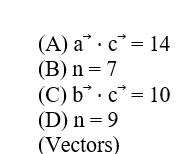Vector Algebra
Get insights from 133 questions on Vector Algebra, answered by students, alumni, and experts. You may also ask and answer any question you like about Vector Algebra
Follow Ask QuestionQuestions
Discussions
Active Users
Followers
New answer posted
4 months agoContributor-Level 10
Given r * a = r * b, which means r * a - r * b = 0 ⇒ r * (a - b) = 0.
This implies that vector r is parallel to vector (a - b).
So, r = λ (a - b) for some scalar λ.
a - b = (2i - 3j + 4k) - (7i + j - 6k) = -5i - 4j + 10k.
So, r = λ (-5i - 4j + 10k).
We are also given r ⋅ (i + 2j + k) = -3.
λ (-5i - 4j + 10k) ⋅ (i + 2j + k) = -3
λ (-51 - 42 + 10*1) = -3
λ (-5 - 8 + 10) = -3
λ (-3) = -3 ⇒ λ = 1.
So, r = 1 * (-5i - 4j + 10k) = -5i - 4j + 10k.
We need to find r ⋅ (2i - 3j + k).
(-5i - 4j + 10k) ⋅ (2i - 3j + k) = (-5) (2) + (-4) (-3) + (10) (1)
= -10 + 12 + 10 = 12.
New answer posted
4 months agoContributor-Level 10
Volume of parallelepiped v = | [a? b? c? ]|
v = | 1 n |
| 2 4 -n| = ±158
| 1 n 3 |
1 (12+n²) - 1 (6+n) + n (2n-4) = ±158
3n²-5n+152=0 or 3n²-5n+164=0
D<0 (no real roots)
n=8, -19/3 ⇒ n=8
then b? ⋅c? = 2+4n-3n=10
a? ⋅c? = 1+n+3n=33
New answer posted
4 months agoContributor-Level 9
|x + y|² = |x|²
(x+y)· (x+y) = x·x
|x|² + 2x·y + |y|² = |x|²
|y|² + 2x·y = 0 (1)
and (2x + λy)·y = 0
2x·y + λ|y|² = 0 (2)
From (1), 2x·y = -|y|².
Substitute into (2):
-|y|² + λ|y|² = 0
(λ-1)|y|² = 0
Assuming y is a non-zero vector, |y|² ≠ 0, therefore λ=1.
New answer posted
4 months agoContributor-Level 10
Let a? = xî + y? + zk
î * (a? * î) = (î·î)a? – (a? ·î)î = y? + zk
Similarly? * (a? *? ) = xî + zk and k? * (a? * k? ) = xî + yk
|î * (a? * î)|² + |? * (a? *? )|² + |k? * (a? * k? )|²
= |y? + zk|² + |xî + zk|² + |xî + y? |² = 2|a? |² = 2 (9) = 18
New answer posted
4 months agoContributor-Level 10
f (x) = a? ⋅ (b? * c? ) = |x -2 3; -2 x -1; 7 -2 x|
= x³ - 27x + 26
f' (x) = 3x² - 27 = 0 ⇒ x = ±3 and f' (-3) < 0
⇒ local maxima at x = x? = -3
Thus, a? = -3i? - 2j? + 3k? , b? = 2i? - 3j? - k? , and c? = 7i? - 2j? - 3k?
⇒ a? ⋅ b? + b? ⋅ c? + c? ⋅ a? = 9 - 5 - 26 = -22
Taking an Exam? Selecting a College?
Get authentic answers from experts, students and alumni that you won't find anywhere else
Sign Up on ShikshaOn Shiksha, get access to
- 66k Colleges
- 1.2k Exams
- 681k Reviews
- 1800k Answers

